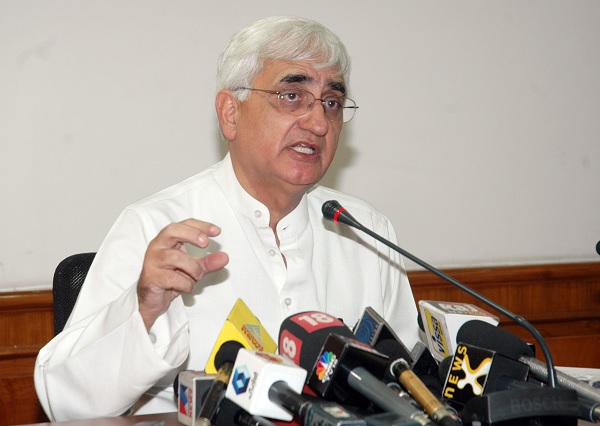
Triple talaq verdict a lesson for Muslim community on reforms: Former minister Salman Khurshid
By Prashant Sood,
New Delhi : The triple talaq bill is a step towards imposing a Uniform Civil Code and the judicial verdict on the practice is a lesson for the Muslim community that matters such as polygamy and nikah halala might similarly end up in court if reformative steps are not taken, Congress leader Salman Khurshid has said.
Khurshid, who has written a book “Triple Talaq: Examining Faith” (OUP/pp 260/Rs 316), said a bill on the subject that is pending in parliament “does not make sense” as the practice has been outlawed by the Supreme Court.
Khurshid, a former External Affairs Minister, accused the BJP-led government of pursuing a “divisive agenda.”
“What is the effect of taking away triple talaq? This is what I have tried to say in my book — that triple talaq is bad. We are not for it. It’s a silly way of giving talaq.
“But there is no difference between talaq and triple talaq, except that talaq is reversible and triple talaq is irreversible,” Khurshid told IANS in an interview.
Asked if the reform on triple talaq should have come from within the Muslim community, Khurshid said: “I agree that this is something that the Muslim community, through its chosen leaders, should have addressed before the court took hold of it. And, therefore, this is a lesson about other matters that might similarly end up in court if the community does not take steps to reform.”
Asked to elaborate, he said: “Polygamy is one such thing and the nikah halala is another one. I think there are good ways of showing and explaining that both of them do not pose as great a threat to equality as is made out to be, but certainly popular perception about them is very bad. Therefore they should be addressed from within the community.”
As per “nikah halala”, a woman divorcee has to marry someone else and consummate this marriage before getting a divorce to remarry her earlier husband.
Khurshid noted that only a microscopic percentage of the Muslim community resorts to instant triple talaq and reforms normally happen if something becomes overwhelming and people think it is becoming a burden. “If it is microscopic, it often gets overlooked, neglected. And then there were larger issues that people amongst Muslims were preoccupied with,” he said.
Asked if the triple talaq bill was a step towards imposing Uniform Civil Code (UCC), he said: “Yes, it certainly is.”
“There is a hidden agenda, or not-so-well hidden agenda, there of trying to impose (the UCC). But even (for) trying to impose it, this is a very shabby way of doing it. You can’t impose the code on the peril of criminal culpability. If it it’s to be introduced, it has to be introduced as a code and that code is not criminal. The code has to be a civilian code.”
Khurshid said talaq is part of personal law and nobody has challenged it.
“It is only triple talaq that has been challenged, and the world over the understanding is that triple talaq or a talaq said three times, six times, 100 times, is only to be considered as talaq said once and talaq said once is perfectly valid and, therefore, triple talaq’s first talaq is also perfectly valid,” Khurshid said.
He said the Congress is very clearly against the criminalising element in the triple talaq bill.
“To impose criminal liability in essentially a civil matter, which is the matter of a family affair, I think, is wrong. Also on fundamental jurisprudential principles, to punish somebody for something that does not exist is against the principles of criminology,” he said.
The Congress and several other opposition parties have said that the bill, which is pending in the Rajya Sabha after the Lok Sabha passed it, should be examined by a select committee.
Khurshid said even women who are against triple talaq have not come out in favour of criminalisation.
Khurshid, who assisted the court during the triple talaq hearing, said if the government is genuinely concerned about divorced women, it should provide for them irrespective of the community they belong to.
Accusing the BJP of pursuing a “silly divisive agenda” to portray Muslims as “regressive”, “counter-productive for modern society” and Muslim society being divided among men and women, Khurshid said: “That is a completely wrong understanding of Muslim society.”
He said the BJP was “grievously mistaken” if it thinks it will get votes of Muslim women due to the triple talaq bill. “You think Muslim women don’t watch television and see what happened to Pehlu Khan and Mohammad Akhlaq who were killed by cow vigilantes? I think it is a very myopic understanding of Muslim women.”
Asked about the perception that the BJP got votes from the Muslim community in (last year’s) Uttar Pradesh assembly polls, Khurshid said: “That’s an impression they give. I have very serious doubts.”
He said the government will not find the going easy on the bill as it lacks a majority in the upper house.
“They still do not have strength to pass it in the house. They may get the strength after a year or whatever, and they just have to wait till then. And then there will be matter of testing it in the courts. It is not smooth sailing as they might imagine,” Khurshod conteded.
(Prashant Sood can be reached at prashant.s@ians.in)
—IANS

